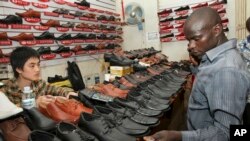This month saw hundreds of Ugandan shop owners march in Kampala against Chinese traders. Local merchants and some city officials want foreigners barred from petty commerce. The government has promised to address the long standing tensions.
Inexpensive Chinese goods are common in the markets of downtown Kampala, where locals operate small businesses selling the imported merchandise. But it has also become increasingly common for Chinese in Uganda to set up shops selling the same items, only cheaper.
Local shop owner Everest Kayondo, the Kampala Capital City Traders Association chairman, says it is time the government barred foreigners from petty trade.
“If your manufacturer who has been selling to you establishes a shop in your home country and is doing both retail and wholesale, you will be ruled out of business. Number two, China is also having a policy of giving tax rebates to their nationals. Once they export, the Chinese will be entitled to a tax rebate, which will make their goods a lot cheaper than their Ugandan counterparts,” Kayondo said.
Uganda has seen sporadic protests on this issue since 2009. Some Chinese have since been deported for working in the country illegally.
But local traders say that is not enough. Last week, they took to Kampala streets blowing whistles and carrying placards with slogans like “Leave our markets.” Government officials were able to talk the traders out of holding a three-day strike.
There is no law in Uganda prohibiting foreigners with work permits from engaging in petty trade. But Ugandan traders complain about foreigners, especially Chinese nationals, who they say come into the country claiming to be large-scale investors, but set up small businesses without proper registration.
Within or outside the law?
VOA spoke to China’s ambassador to Uganda, Zheng Zhu Qiang, who insisted the traders are not breaking any laws.
“Chinese businessmen are within the legal bordering and no one violates the law, but there is phenomenon because someone is not happy. I think we should resolve this issue by law. And another thing is that, as far as I know, if you import tiles from China, there is tax. It is groundless to say that Chinese traders do not pay tax,” Zheng said.
Uganda State Minister for Investment and Privatization at the Ministry of Finance, Evelyn Anite, says the ministry is looking into the issue.
“It is not anywhere in our policy that we want foreigners to come and trade in the country. We want these foreigners to come and invest in our country as investors. And that is why we are working on our investment policy. And when we license an investor we do not want them to end [up] downtown. And for us to even give you an investment license, we want to see that you are having a bank guarantee from a reputable bank in your country or from Uganda of not less than $250,000.”
According to Ministry of Trade statistics, China is Uganda’s second largest source of imports, after India, and second largest source of foreign direct investment, a total of $9.8 billion since 1993 according to the Uganda Investment Authority.
Most of this money has been through loans for construction of major infrastructure projects such as the hydropower dams and the Entebbe express highway.




